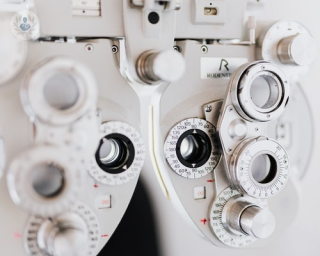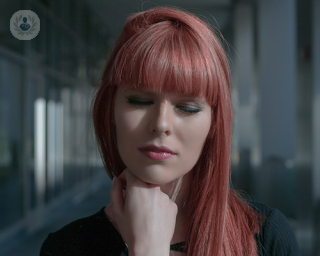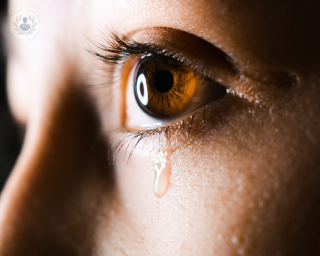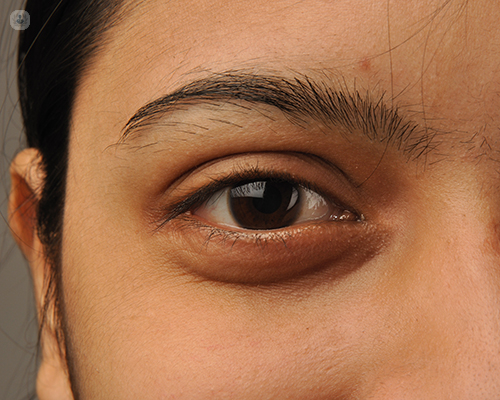What is dry eye syndrome?
Dry eye syndrome, also known as keratoconjunctivitis sicca, is a common condition that happens when the eye doesn’t make enough tears and isn’t lubricated enough, normally due to meibomian gland dysfunction (located in the eyelids and responsible for lubricating the eyes). This affects the ocular surface: the tear film, eyelids, conjunctiva, and cornea.
This condition mainly affects women and the risk of getting it increases with age.
Disease prognosis
Dry eye syndrome does not tend to be a serious condition; people affected tend to have some discomfort but don’t normally have vision loss.
By following the specialists’ advice, it normally disappears within a few days.
What are the symptoms?
The main symptoms of dry eye syndrome are tired eyes, light sensitivity, blurred vision, gritty sensation, burning, or redness. These symptoms are normally worse in environments with wind, smoke, air conditioning, dust, or low humidity. Another symptom could be an intolerance to contact lenses.
Tests for dry eye syndrome
Tests for dry eye syndrome include visual acuity measurement, slit lamp examination, measurement of the rate of tear production, tear concentration, and tear film break-up time.
What causes it?
It is normally caused by hormonal changes that make the eyes produce less tears, such as the menopause or ageing. Other causes include sun exposure, some antianxiety medications, contraceptives, a dry environment (for example air conditioning or wind), smoking, heat, or past surgery, among others. Other possible causes include allergies, rheumatic diseases, and the use of electronic devices.
How can it be prevented?
To avoid dry eye syndrome, it is recommended that low humidity places are avoided and some predisposing drugs. It is always important to see a dry eye specialist to have a correct diagnosis and, if necessary, treatment.
11-13-2012 03-24-2023Dry eye
Mr Scott Robbie - Ophthalmology
Created on: 11-13-2012
Updated on: 03-24-2023
Edited by: Conor Dunworth
What is dry eye syndrome?
Dry eye syndrome, also known as keratoconjunctivitis sicca, is a common condition that happens when the eye doesn’t make enough tears and isn’t lubricated enough, normally due to meibomian gland dysfunction (located in the eyelids and responsible for lubricating the eyes). This affects the ocular surface: the tear film, eyelids, conjunctiva, and cornea.
This condition mainly affects women and the risk of getting it increases with age.
Disease prognosis
Dry eye syndrome does not tend to be a serious condition; people affected tend to have some discomfort but don’t normally have vision loss.
By following the specialists’ advice, it normally disappears within a few days.
What are the symptoms?
The main symptoms of dry eye syndrome are tired eyes, light sensitivity, blurred vision, gritty sensation, burning, or redness. These symptoms are normally worse in environments with wind, smoke, air conditioning, dust, or low humidity. Another symptom could be an intolerance to contact lenses.
Tests for dry eye syndrome
Tests for dry eye syndrome include visual acuity measurement, slit lamp examination, measurement of the rate of tear production, tear concentration, and tear film break-up time.
What causes it?
It is normally caused by hormonal changes that make the eyes produce less tears, such as the menopause or ageing. Other causes include sun exposure, some antianxiety medications, contraceptives, a dry environment (for example air conditioning or wind), smoking, heat, or past surgery, among others. Other possible causes include allergies, rheumatic diseases, and the use of electronic devices.
How can it be prevented?
To avoid dry eye syndrome, it is recommended that low humidity places are avoided and some predisposing drugs. It is always important to see a dry eye specialist to have a correct diagnosis and, if necessary, treatment.


Dry eye syndrome 6 months after cataract surgery
By Mr Bal Manoj
2024-11-21
Cataract surgery can result in dry eye syndrome and in this condition, the surface of the eye becomes dry due to not producing enough tears. While it’s not a danger to your health, it can be irritating and bothersome. Mr Bal Manoj, a leading cataract surgeon who has performed countless cataract surgeries, explains why dry eye syndrome happens after surgery and how it’s treated. He also offers his professional advice for avoiding dry eye. See more


What causes blepharitis?
By Mr Myer Mark Yodaiken
2024-11-21
Blepharitis is a condition which manifests as dry, burning, scratchy, red, and itchy eyes. The eyelids can become sore and you may experience a gritty feeling in your eyes. Who is affected by blepharitis and what causes it? Expert ophthalmologist Mr Myer Mark Yodaiken explains. See more


Is crying really good for you?
By Mr Robert Longhurst
2024-11-21
Crying, although usually associated with sadness, can actually do us a lot of good. As well as helping us to release built-up tension and being good for our emotional wellbeing, tears are an essential part of the eye's system for removing harmful irritants, bacteria and debris from the eye. In this article, optometrist and dry eye and neuro-optometry expert Mr Robert Longhurst explains why crying is good for the eyes. See more


Nasolacrimal duct obstruction: what causes a blocked tear duct?
By Mr Radwan Almousa
2024-11-21
When you have a blocked tear duct, your tears don't drain out of the eye properly, so they end up overflowing and running down your cheeks. It's usually caused by a complete or partial obstruction in the tear drainage system, however, there can be other causes. Mr Radwan Almousa, a highly-skilled consultant ophthalmologist in London, explains. See more
Experts in Dry eye
-
Professor Chris Hammond
OphthalmologyExpert in:
- Strabismus (squint)
- Paediatric ophthalmology
- Cataract surgery
- Glaucoma
- Dry eye
-
Miss Valerie Saw
OphthalmologyExpert in:
- Cataracts
- Laser eye surgery
- Dry eye
- Keratoconus
- Corneal transplant
- Corneal cross-linking
-
Mr Ian Subak-Sharpe
OphthalmologyExpert in:
- Cataracts
- Dry eye
- Watery eyes
- Eyelid malpositions
- Blepharoplasty
- Oculoplastics
-
Miss Vickie Lee
OphthalmologyExpert in:
- Ptosis (droopy eye)
- Oculoplastics
- Chalazion
- Thyroid eye disease
- Watery eyes
- Dry eye
-
Professor Sunil Shah
OphthalmologyExpert in:
- Cataracts
- Corneal transplant
- Refractive surgery
- Laser eye surgery
- Lens replacement (intraocular lenses)
- Dry eye
- See all

The Meriden Hospital - part of Circle Health Group
The Meriden Hospital - part of Circle Health Group
Clifford Bridge Road, Coventry
No existe teléfono en el centro.
By using the telephone number provided by TOP DOCTORS, you automatically agree to let us use your phone number for statistical and commercial purposes. For further information, read our Privacy Policy
Top Doctors

Laser Vision
Laser Vision
Prema Compass Road North Harbour Business Park Portsmouth PO6 4RP
No existe teléfono en el centro.
By using the telephone number provided by TOP DOCTORS, you automatically agree to let us use your phone number for statistical and commercial purposes. For further information, read our Privacy Policy
Top Doctors

Hendon Hospital - part of Circle Health Group
Hendon Hospital - part of Circle Health Group
46/50 Sunny Gardens Rd, London NW4 1RP
No existe teléfono en el centro.
By using the telephone number provided by TOP DOCTORS, you automatically agree to let us use your phone number for statistical and commercial purposes. For further information, read our Privacy Policy
Top Doctors
-
The Meriden Hospital - part of Circle Health Group
Clifford Bridge Road, Coventry , CoventryExpert in:
- Cancer
- Cardiology
- Colorectal surgery
- Shoulder surgery
- Hand surgery
- General Surgery
-
Laser Vision
Prema Compass Road North Harbour Business Park Portsmouth PO6 4RP, HavantExpert in:
- Cataracts
- Laser eye surgery
- ICL lens implants
- Ophthalmology
- Keratoconus
- Lens replacement
-
Hendon Hospital - part of Circle Health Group
46/50 Sunny Gardens Rd, London NW4 1RP, North LondonExpert in:
- Cardiology
- General Surgery
- Gastroenterology
- Hand and wrist
- Nutrition and Dietetics
- Foot and ankle
- See all
- Most viewed diseases, medical tests, and treatments
- Genetic testing
- Minimal access surgery (keyhole surgery)
- Botulinum toxin (Botox™)
- Orthoptics
- Medicolegal
- Dermal fillers
- Headache
- Strabismus (squint)
- Glaucoma
- Diplopia (double vision)









